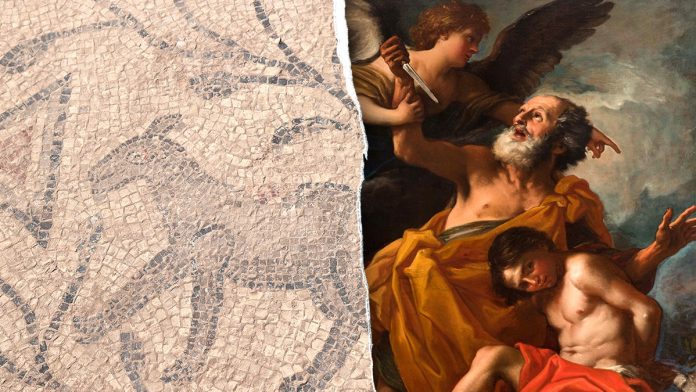NEWYou can now listen to Fox News articles!
Archaeologists in Turkey recently unearthed a 1,500-year-old Christian floor mosaic in Urfa, a city traditionally regarded as the birthplace of Abraham.
The discovery was reported by Anadolu Agency (AA), a state-run outlet based in Ankara, on Oct. 19. Officially known as Şanlıurfa, Urfa is located in southeastern Turkey and home to the historic Urfa Castle, a Byzantine-era structure.
The mosaic was uncovered at Urfa Castle and dates back to the fifth century AD. It was constructed between 460 and 495 AD.
Urfa, formerly the Mesopotamian city of Edessa, is said to have been the birthplace of Abraham. Though archaeologists now consider the ancient city of Ur in Iraq to be the likelier site, Urfa has long been a pilgrimage destination for Muslims and Christians alike.
SURPRISED ARCHAEOLOGISTS UNEARTH ANCIENT GRAVES CAUGHT BETWEEN PAGAN, CHRISTIAN RITUALS IN POLAND

Archaeologists uncovered a 1,500-year-old Christian mosaic at Urfa Castle in Şanlıurfa, a Turkish city long regarded as the birthplace of Abraham. (Esber Ayaydin/Anadolu via Getty Images; Fine Art Images/Heritage Images/Getty Images)
Pictures from the site show the small, ancient tiles arranged in geometric patterns, as well as an inscription in Koine Greek. The artwork also features motifs of animals and plants.
Additionally, archaeologists found three burials of religious officials at the site, as well as medallion-shaped mosaics representing air, water, earth and fire.
Excavation leader Gülriz Kozbe told AA that the mosaic likely formed part of a Christian site, possibly a church or a shrine dedicated to martyrs.
CLICK HERE TO SIGN UP FOR OUR LIFESTYLE NEWSLETTER
“The inscription mentions that the floor was built for the protection of Count Anaskas and his family, and references high-ranking church figures such as Bishop Kyros and Chief Priest Elias,” said Kozbe.

Intricate geometric designs and natural motifs appear in the ancient Byzantine mosaic unearthed at the Urfa Castle site. (Esber Ayaydin/Anadolu via Getty Images)
“This helps us identify who oversaw the area’s religious duties at the time.”
The archaeologist added that the mosaic’s symbols – especially the depictions of natural elements – shed light on ancient religious rituals.
CLICK HERE FOR MORE LIFESTYLE STORIES
“These symbols offer clues about the religious rituals once practiced here,” Kozbe said.

The fifth-century mosaic was found alongside burials believed to belong to early Christian religious officials. (Esber Ayaydin/Anadolu via Getty Images)
Urfa Castle was damaged during the February 2023 Turkey–Syria earthquakes. Speaking to AA, Urfa governor Hasan Şıldak said the discovery represents significant progress in preserving the city’s historic character.
“We aim to complete the restoration and open the castle to visitors by late 2026,” the governor said.
TEST YOURSELF WITH OUR LATEST LIFESTYLE QUIZ
“This newly discovered Byzantine mosaic — possibly the floor of a church — will add great cultural and scientific value to Şanlıurfa’s tourism and history.”

The Byzantine-era floor mosaic, dated between 460 and 495 A.D., was found at Urfa Castle. (Esber Ayaydin/Anadolu via Getty Images)
The discovery is one of many recent Asia Minor finds that shed light on early Christianity.
Last month, Turkish excavators found a Roman hospital-turned-Christian sanctuary in the ancient city of Kaunos.
CLICK HERE TO GET THE FOX NEWS APP
Also in October, archaeologists unearthed more than 60 tombs in Colossae, a city immortalized in the Bible.




